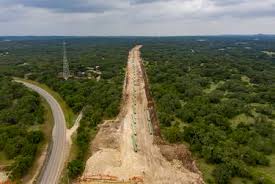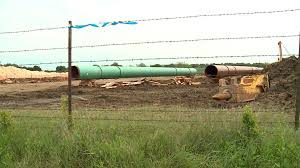
The COVID-19 pandemic has drastically cut into oil and gas exploration in Texas but not construction of the Permian Highway Pipeline, one meant to carry natural gas from the Permian Basin to the ports of south Texas.
Inspectors with the Texas Railroad Commission continue their inspections of the 400-mile line which is considered one of the largest pipeline projects under construction in the state this year.
Reports indicate that state inspectors have carried out more than 75 inspections since March and also investigated nearly 20 complaints about the line that will run through Texas Hill Country, a route that has brought opposition and lawsuits.
At last word, Railroad Commission inspectors were at a site near the Perdernales River in Gillespie County as Kinder Morgan, the operator of the pipeline works to create a pathway under the river reported World Oil.
“Our inspectors have been hard at work, even during the COVID-19 pandemic, to ensure Kinder Morgan is compliant with Commission rules that are in place to protect public safety and natural resources,” said RRC Executive Director Wei Wang. “In addition to the all-hands efforts within the agency, we are also in contact with resident groups and the company as construction progresses. When it is complete, this pipeline will add vital capacity to convey natural gas, which in turn will also help ongoing efforts to further reduce flaring in West Texas.”

New pipelines are important to efficiently and safely transport large amounts of natural gas and oil. The Texas Pipeline Association estimates that a 20-inch pipeline running 50 miles can replace 1,650 tanker trucks carrying oil on the road. Pipelines also help reduce flaring by alleviating potential backing up of supply at the point of production.
RRC Oil and Gas inspectors have been at construction sites to ensure the operator has been compliant with agency rules to prevent the pollution of surface and groundwater resources.
Oil and Gas Field Operations staff also issued a notice of violation related to a drilling fluid spill that occurred in the spring.
Pipeline Safety inspectors have conducted multiple inspections of pipeline installation and pipe yards. The inspections include but are not limited to welding, pipe transportation procedures, coating thickness inspections, backfilling of trenches; safety equipment operability, and materials records.
The PHP is expected to be complete in early 2021.
Source: World Oil





